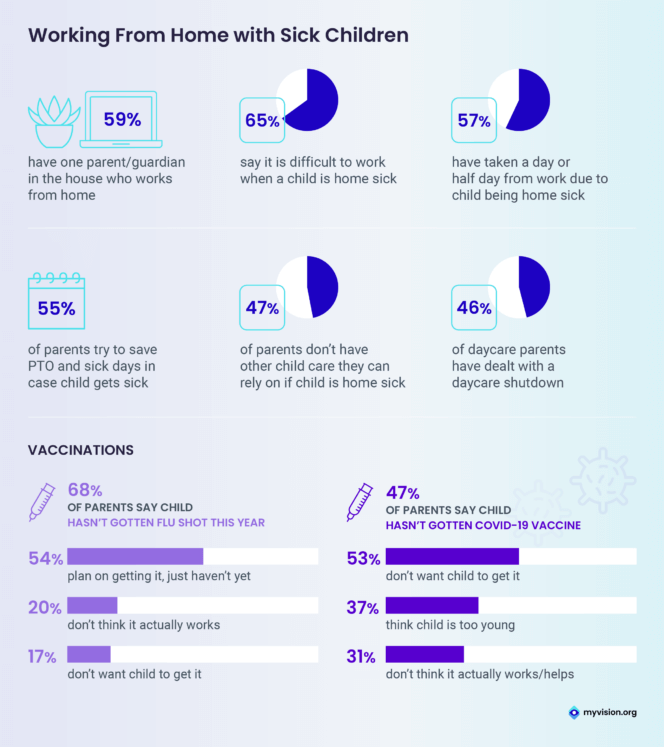ALISO VIEJO, Calif. — Children occasionally picking up an illness at school is nothing new, but a new survey has found that this trend may be reaching a concerning level in 2022. A new poll finds that nearly half of parents say their children have already been sick this school year.
The survey of more than 1,000 parents with kids under 17, conducted by MyVision.org, reveals that 70 percent of moms and dads still fear their children will catch COVID-19. Nearly two in three (63%) worry about the flu and 46 percent are concerned that their kids will have to stay home with a cold.
Fears that students will have stomach flu (37%), strep throat (37%), head lice (32%), or pink eye (19%) are also stressing out parents as many children return to full-time, in-person learning this fall.
Overall, the poll finds 48 percent of children have already been sick during the 2022-2023 school year. Three in four caught a common cold virus, but 22 percent actually contracted COVID, and another 10 percent had stomach flu. With all these illnesses floating around, just 22 percent of parents say they don’t worry about their kids catching something in the classroom.
How are parents keeping kids healthy?
Just like during the worst days of the pandemic, four in five parents (78%) are continuing to stress the importance of washing hands regularly. More than half (54%) encourage their children to use hand sanitizers.
With kids going back to school, 44 percent of moms and dads are also discouraging their children from sharing snacks with friends and 56 percent make sure they’re eating healthy foods.
Despite the emphasis on health, only 60 percent are updating their kids’ vaccinations. In fact, 68 percent of parents have not taken their children to get a flu shot this year. Nearly half (47%) say their kids are still unvaccinated against COVID-19. Of these parents, 53 percent don’t want their children to get the shot and 37 percent think their children are too young to get the vaccine. Three in 10 believe the COVID-19 vaccine won’t actually protect kids from the virus.
Moreover, the survey finds 45 percent of parents admit they struggle to get their children to follow the health precautions they are emphasizing.

Taking sick days for the kids
With many studies finding adults often go to work sick and shy away from using their sick days, the new poll has found one reason they’re doing this: they’re saving these days for their kids!
With four in five believing their children will get sick at some point during this school year, 55 percent of parents say they save their paid time off (PTO) and sick days in case their kids get sick and need to stay home from school. Nearly half the poll (47%) say they don’t have another option for childcare if their children have to stay home sick.
Luckily, 59 percent say at least one parent or guardian in their house now works from home. However, 65 percent say it’s difficult to get anything done when a child is home sick. Nearly six in 10 admit they’ve had to take a day off or work a half-day when their child was home sick.
So far, 45 percent of parents say their children have had to stay home from school due to an illness this school year. Another 13 percent were sent home because they were sick.
Interestingly, 70 percent of moms and dads send their children to school when they have a runny nose. One in four (27%) do the same when they have a sore throat and 30 percent don’t take a child to the doctor when they suspect they have pink eye.
Methodology:
In September 2022, MyVision.org surveyed 1,055 parents of children between 2 and 17 to get their feedback on childhood illnesses. Respondents ranged in age from 20 to 67 with an average age of 37. 50% of respondents were female, 48% male, and 2% non-binary/transgender.

